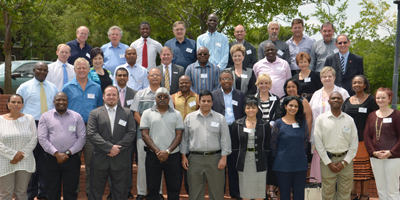Latest News Archive
Please select Category, Year, and then Month to display items
06 April 2018
Photo Rulanzen Martin
 From the left: Dr Thulisile Mphambukeli, leader of the BRICS research team that is exploring the political economy of water and food security, and her research partner, Dr Victor Okorie.
From the left: Dr Thulisile Mphambukeli, leader of the BRICS research team that is exploring the political economy of water and food security, and her research partner, Dr Victor Okorie.
A Brazil, Russia, India, China and South Africa (BRICS) delegation is to hold the 10th Annual BRICS Summit in the last week of May 2018 in Johannesburg. Dr Thulisile Mphambukeli, leader of the University of the Free State (UFS) research team alongside Dr Victor Okorie from the Department of Urban and Regional Planning, in collaboration with Prof Lere Amusan of North-West University, will ensure that water and food security is a prominent feature on the gathering’s agenda.
First, the project titled: “Exploring the political economy of water and food security nexus in BRICS and Africa” will debut at the National Institute for the Humanities and Social Sciences BRICS Think Tank Forum”.
According to Dr Mphambukeli, the key to water security is attitudinal change by means of education and conscientisation. This, she is adamant about, holds the potential to drive behavioural adjustments in the way society interacts with water.
Genetic and social approaches
Dr Okorie asserts that if strides towards reducing the demand for water were to be made, research efforts should be geared towards effecting changes at DNA level. Meaning we need to explore waterwise ways that enable crops and animals to thrive optimally.
The project also looks at social dimensions of water such as flushing a toilet. “Research activities on redesigning toilets, especially the urinal, where more than nine litres of water are used to flush less than one cubic centimetre of urine, are timely in the context of managing water and the food nexus crises,” said Dr Okorie.
Combining the genetic and social approaches would allow us to produce more with a smaller water footprint. This can be made possible by implementing precision agriculture which is about estimating and applying exact quantities of water and nutrients needed for the production of crops or the raising of livestock.
Paradigm shifting policies
Prof Amusan said the team intended to propose functional solutions that take the quality of water into consideration. Equitable production and distribution of water depends on endorsing policies of co-production between citizens, governments and the public sector. BRICS member states mutually consider water and food security as an issue of paramount significance, hence its feature on this prestigious summit’s agenda.
UFS hosts the 11th annual Registrars’ Imbizo
2014-03-14
|
 |
The University of the Free State recently hosted the 11thAnnual Registrars’ Imbizo which took place on 3 – 5 March 2014 at the Centenary Complex on the Bloemfontein Campus. Convening from across the country, up to 37 delegates affiliated to the Office of the Registrar shared their experiences and expertise. It also provided an opportunity to raise their concerns about their role in governance and academic administration.
At the opening of the Imbizo, Prof Driekie Hay, Vice-Rector: Academic Affairs, acknowledged the challenging and complex task of registrars in South African universities. Prof Hay highlighted the complexities in the history of higher education and the policy environment in particular. She raised concerns around funding for higher education, policy amendments passed through parliament and the newly-proposed reporting regulations for universities. She also referred to the introduction of a transformation oversight committee to evaluate the effectiveness of transformation at universities.
During the three-day Imbizo, delegates focused on matters such as finance and administrations, policy in higher education as well as social media and its impact on higher education. Dr Derek Swemmer, Registrar of the UFS and Chairperson, concluded the event. The visit included some sight-seeing – touring the Bloemfontein Campus and surrounds.